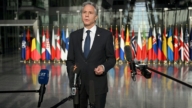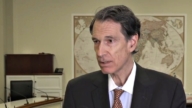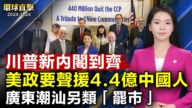【新唐人2014年04月25日讯】美国总统欧巴马正在日本访问,这是他23号到29号出访亚太四国的第一站。由于他在动身前高调重申了《美日安保条约》,外界普遍认为,美国打算联合亚太国家,抵制中共违反国际法的行动。让我们一起去看看专家们的分析。
欧巴马这次亚洲之行将访问日本、韩国、菲律宾和马来西亚四国。23号,他已经抵达日本首都东京,24号,他会见了日本首相安倍晋三。据报导,亚太地区的和平与安全问题是欧巴马此行的重点。
旅美政论家伍凡:“他的目地既要保护日本,又要抑制中国不要动武,再怎么争吵都可以但不要动武,因为一动武,美国非要介入,美国不愿意介入。所以最好的办法就是维持现状,遵守国际法。给日本人吃个定心丸,但是也不激怒北京。中共想在亚太把美国挤出去,就是中日之间争龙头。”
在欧巴马访问亚太四国前两周,4月8号到10号,美国国防部长哈格尔访问了北京。哈格尔在北京的公开演讲中说:他认为应该通过三个渠道发展新型军事关系。首先是保持持续和实质性对话,其次是在两国利益一致的领域进行具体的务实合作,最后是努力通过开放和相互沟通管理竞争和分歧。
伍凡:“欧巴马这次到亚洲来,他是要想把四个国家——日本、韩国、菲律宾、马来西亚,拉到他那一边,共同抵抗中国(共)。但是中共也在用利益的手段拉韩国和拉马来西亚,他知道拉不动菲律宾、日本,它正在做。”
欧巴马在启程飞往日本前,接受了日本《读卖新闻》的专访。他表示,美国反对任何国家单方面试图损害日本对有争议岛屿的管理。他还强调,依照《美日安保条约》,如果日本受到攻击,美国有义务提供防御。他还呼吁各方通过外交和沟通而不是胁迫或恐吓来解决争议。
旅美新唐人时事评论员蓝述:“这一次欧巴马特别突出的就是:日美安保条约是美国太平洋政策的基础,从地理位置上来讲,日本他的战略地位非常重要,是整个自由世界和极权世界互相之间对峙的前哨。保证了日本的安全、加强美日之间的关系,最根本维护的就是自由世界的价值。”
东京“上智大学”政治学教授中野浩一(Koichi Nakano)也判断:“美国会留在这里,并且有浓厚的兴趣和这些国家一起应付中国。”
中共外交部23号反驳了美国的态度,大陆媒体还对美国提出警告。
蓝述:“目前中共与中国民众之间的矛盾到了前所未有尖锐的程度,在这种情况下,炒作钓鱼岛的问题,对中共打民族主义这张牌,维持中国社会的稳定有一定的利用价值。西方任何不大谨慎的行为,很可能就会成为中共转移视线的靶子,所以也都很谨慎。”
美国参议院外交关系委员会上周发布的一份报告说,美国应投入更多资金和努力,加强亚太地区的联盟。而且“一个成功的再平衡战略,必须强调这样一个战略信息:该政策代表着美国将持久致力于该地区,向我们的伙伴们确保我们将长期这样做”。
采访编辑/唐音 后制/陈建铭
Is Obama Joining Asia Allies to Stand Against Chinese Communist Party?
U.S. President Barack Obama is visiting Japan.
This is the first stop in his four-nation
Asia visit from April 23 to 29.
His reiteration of the US-Japan Security Treaty is
interpreted that the US is forming allies in the region.
These relationships stand against the Chinese
Communist Party intention’s to break international laws.
Let’s take a look at our experts analysis.
President Obama’s four-nation tour includes
Japan, South Korea, Philippines and Malaysia.
He met with Japanese Prime Minister Shinzo Abe on April 24.
It is reported that peace and security in the
Asia-Pacific region is the focus of Obama’s trip.
Wu Fan, political commentator: “His purpose
is to protect Japan and restrain the Chinese
Communist regime from attacking in the region.
The US has to intervene if conflict
erupts, but no one wants a war.
Therefore, it would be desirable to maintain a status
quo. It attempts to soothe Japan without irritating Beijing.
The CCP is anxious to compete for a leading
role with Japan, by pushing the US away."
U.S. Secretary of Defense Chuck Hagel
visited Beijing between April 8 and 10.
This was two weeks before Obama’s four-nation visit.
Hagel said in a public speech in Beijing that
to, develop a new model of military-to-military
relations, the U.S. believes its approach should
be to build a sustained and substantive dialogue.
This is to deepen practical cooperation
in areas of common interests.
It is to manage competition and manage
differences through openness and communication.
Wu Fan: “Obama’s Asia trip is to unite the
four countries – Japan, Korea, The Philippines
and Malaysia in order to resist China together.
However, China is trying to connect with Malaysia
and South Korea through economic benefits.
It knows that it can’t attract
The Philippines and Japan."
Before departing, Obama told Japan’s Yomiuri Shimbun
that the United States opposes any unilateral attempts
to undermine Japan’s administration of these islands.
He also stressed that in accordance with the
US-Japan Security Treaty, if Japan is attacked,
the United States is obliged to provide defense.
He insisted that, disputes need to be resolved through
dialogue and diplomacy, not intimidation and coercion.
Lan Su, NTD commentator: “Obama’s
visit is prominent for this reason.
The US-Japan Security Treaty is the
foundation of the U.S. Pacific policies.
Geographically speaking, Japan’s
strategic position is very important.
It is an outpost between the entire
free world and totalitarianism.
For the security of Japan, and to strengthen
US-Japan relations, the US has maintained
the most fundamental values of the free world."
Associated Press reported that, “America is here to stay.
It is going to keep a strong interest in dealing with China
together with those countries", said Koichi Nakano, a
political science professor at Tokyo’s Sophia University.
China’s foreign ministry said on
Wednesday that it opposed the US stance.
State-run media also commented
with warnings aimed towards the US.
Lan Su: “The conflict between the CCP and the
Chinese people has reached an unprecedented level.
The hype over the Diaoyu Islands issue has a certain
value to the CCP for ‘maintaining it’s stability’ in society.
Any acts of aggression could become the
target of the CCP to divert its domestic tension.
That’s why every country has been careful."
AP reported on a report released last week by U.S. Senate
Foreign Relations Committee, which urged that more effort
and money be devoted to upgrading Asia-Pacific alliances.
“A successful rebalance must underscore the
strategic message that the policy represents an
enduring U.S. commitment to the region, assuring
our partners that we are in it for the long haul."
Interview & Edit/Tang Yin Post-Production/Chen Jianming




























